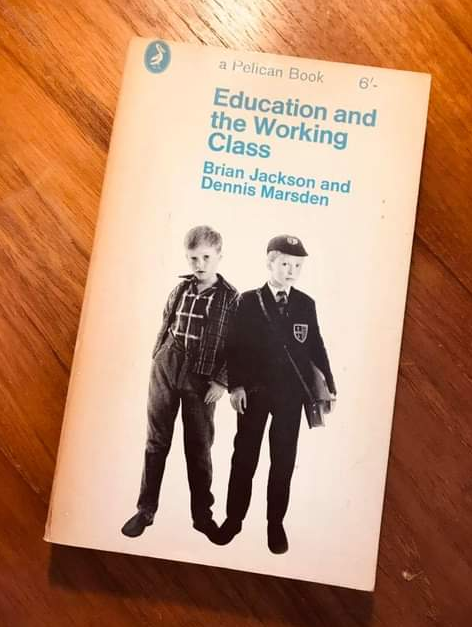 Diane Roby has founded the ‘Wilsthorpe Project,’ named after her old secondary modern school. Here are her words explaining this fantastic project.
Diane Roby has founded the ‘Wilsthorpe Project,’ named after her old secondary modern school. Here are her words explaining this fantastic project.
This is a social and historical enquiry into working-class children who, like myself, failed the 11-plus and went to a secondary modern school in the fifties and sixties. It was inspired as a result of reading ‘Education and the Working Class’ by Brian Jackson and Dennis Marsden. They interviewed a number of Huddersfield working class boys and girls who had passed the 11-plus and were curious to know how this had affected them and their futures. Apparently working-class children were likely to pass if they lived near a school whose catchment was predominantly middle class; they were the oldest child; they were from a small family and they were born between September and December.
My own research is concerned with the 80% who didn’t pass. It’s not an academic thesis despite my extensive reading about the 1944 Education Act and how it led to ‘Secondary Education for All.’ It is a companion piece to Jackson and Marsden and an attempt to explore the impact of that failure on children, both in secondary education and beyond.
I have concentrated my enquiries on a small cohort who attended a secondary school (Wilsthorpe) where I lived in 1956 – Long Eaton. I was interested to learn whether what had happened at a micro level would be illustrative of what happened across the country.
CASE STUDIES
A small sample of the comments below (edited and names changed) gives an insight into their experiences of the 11-plus. For all participants, however, there was little preparation for the exam and most were puzzled by its content.
Mark – who later became the Principal of a Further Education College.
‘My school was an interesting experience. In 1958 (our second year), a major revision of the school timetable took place whereby traditional subject barriers were abolished. With the exception of PE, we all embarked on carrying out ‘projects’ of our own choosing. There were no English lessons and we taught ourselves Maths, by working on our own through a series of ‘Beacon Arithmetic’ workbooks. In theory, each pupil would work through two workbooks a year, completing the series at the end of year four. It didn’t work out like that. Some pupils worked assiduously on the scheme – even taking the workbooks home. Others did what we had to and many of us fell behind.’
Ann – has a degree and later became a teacher.
‘I was expected to pass the 11-plus, as both my siblings had attended the Grammar School. My family were shocked when I failed. However, I don’t recall any preparation for the exam and no one passed that year.’
Sandra – later gained a B.Sc.
Sandra recalls receiving little preparation for the 11-plus and being very puzzled by it.
Susan – later a Teaching Assistant
‘I remember the 11-plus but the questions didn’t make sense.’
CONSEQUENCES
Out of a class of eighty in Mark’s year, only four passed the 11-plus. Failing, for at least one project participant from this school was a bitter blow as there had been an expectation by parents and teachers alike, that he would pass. When interviewed he stated that the failure followed him for a long time, this despite his and fellow pupils’ many later achievements.
Failing the 11-plus left most children with a skewed, one-sided version of their ability and where it placed them in the world. A few children didn’t want to go to grammar school, which they regarded as ‘snooty’. Of the people I interviewed, most were reconciled, along with their friends, to the prospect of attending the local secondary modern – Wilsthorpe.
Many people have questioned both now and in the past whether assessment at the age of ten or eleven and streaming even earlier, is too early and I quote here Edward Blishen – author and historian – who recognised that this early labelling of children was damaging:
‘There are many ways of damaging a child; one of the worst, I think, is to imprison him in a definition. He is a secondary modern child; he is capable of this or that limited amount of mental effort; this or that term must be placed on his schooling.’
and, Harold Dent, Editor of ‘The Times Educational Supplement’ 1940-1952:
‘….no other single feature in the English educational system caused between 1945 and 1957 a tithe of the trouble, anxiety, heartache, discouragement and downright misery as did the 11-plus.’
Following the introduction of comprehensive education and the funding of further and higher education, many of the interviewees have had very successful careers. One group who had moved to Wilsthorpe from the same Junior school gave an account of the changeover in 1964 when they were transferred from the secondary modern to the local grammar school for ‘O’ level study. They were segregated from the pupils who had passed the 11-plus, given a separate uniform and a form name indicating they were from the secondary modern. Teachers at the school were less than enthusiastic about their arrival. The result of this was that it engendered a great sense of camaraderie among them and to this day they still meet.
There is much more to say about the times in which we lived, particularly about apprenticeships, training and the move to introduce qualifications into secondary modern schools.
The 11-plus is an anachronism which does nothing to mediate its original bias towards privilege. I welcome the campaign to end it.
Visit www.wilsthorpe1957.net to learn more, or explain how the 11-plus impacted your life at 11+ Anonymous.





